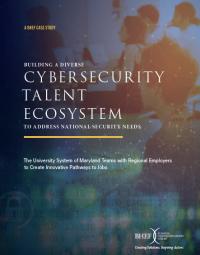Building a Diverse Cybersecurity Talent Ecosystem to Address National Security Needs
The University System of Maryland Teams with Regional Employers to Create Innovative Pathways to Jobs
This case study examines how BHEF member, the University System of Maryland (USM), collaborated with businesses and government agencies to develop cybersecurity pathways on multiple campuses to build a diverse regional cybersecurity talent ecosystem that can address national security needs. It also provides recommendations for stakeholders in government, business, and higher education on developing an ecosystem for cybersecurity skills needs—or one that can serve as a model for other fields.
This case study builds upon BHEF’s work to create new undergraduate pathways in high-skill, high-demand fields. As part of HEWI, BHEF received a $400,000 grant from the Alfred P. Sloan Foundation in 2012 to work with USM and the Northrop Grumman Corporation on the development of undergraduate pathways in cybersecurity. In partnership with BHEF, USM pursued a coordinated, system-level effort to create new cybersecurity pathways that would attract diverse students, engage them in cutting-edge learning experiences, and encourage them to build their careers in the region.

